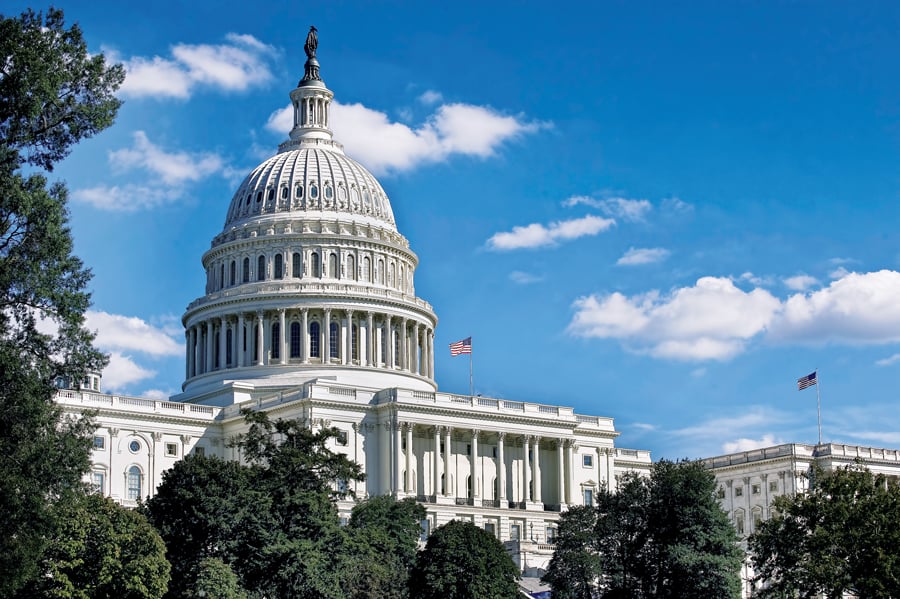

This story has been updated to reflect the evolving congressional calendar.
President Donald Trump is calling for a payroll tax cut as an antidote to the economic sickness brought on by the coronavirus, but the idea is getting a lukewarm initial reception among lawmakers.
“Currently, there is little appetite for a payroll tax cut on Capitol Hill in both parties,” said Brian Gardner, managing director at Keefe Bruyette & Woods, an investment bank and broker-dealer that specializes in the financial services sector.
Relief from payroll taxes, of which Social Security and Medicare taxes are part, is not likely to be included in any legislative package Congress puts together in the next week or so. The Senate will be in session next week, but the House is scheduled to be on recess.
Sen. Charles Grassley, R-Iowa and chairman of the Senate Finance Committee, is considering “targeted tax relief measures” to respond to the economic shock caused by the coronavirus, spokesman Michael Zona said in a statement.
He did not reveal Mr. Grassley’s position on a payroll tax cut.
“All reasonable options remain on the table,” Mr. Zona said.
Sen. Ron Wyden, D-Ore., and the top Democrat on the Senate Finance Committee, has expressed doubts about whether a payroll tax cut can stem a coronavirus economic fallout.
“A payroll tax cut can be an effective tool, but it’s not the best answer in this case,” Mr. Wyden said in statement Tuesday. “A payroll tax cut would do little to help workers without paid sick days or those who have lost shifts and tips.”
Senate Democrats have offered a bill that focuses on paid sick days and emergency unemployment insurance, as well as small-business, housing and health initiatives. House Democrats have floated a similar measure.
Although Mr. Trump advocated for a payroll tax cut in his national address about the coronavirus on Wednesday night, there hasn’t been a strong push for the policy from Republican lawmakers.
Dean Zerbe, national managing director at alliantgroup, a tax services firm that works with small and midsized businesses, said proponents of a payroll tax cut haven’t been doing a good job selling it.
“I haven’t seen Republicans or pro-business Democrats making the case on the benefits to businesses that are trying to keep their employees on payroll,” said Mr. Zerbe, a former senior tax counsel on the Senate Finance Committee.
The political atmosphere surrounding economic responses to the coronavirus may change as the epidemic continues.
Lawmakers could change their minds. Democrats supported temporary payroll tax relief during the Obama administration. Tax cuts always have been a staple of Republican policy.
“We’re in early days,” Mr. Gardner said. “Things are likely to change rapidly.”
Marc Gerson, a member at Miller & Chevalier, said Republicans and Democrats could come together on some form of payroll tax suspension.
“I think bipartisan agreement will depend on a variety of factors, including the length and severity of the crisis, its impact on the economy and whether or not there is an effort to pay for the cost of the relief,” Mr. Gerson, a former tax counsel to the House Ways and Means Committee, wrote in an email.
One investment adviser doesn’t want to see a payroll tax cut gain traction.
“For a typical garden variety type recession, a payroll tax cut is a good idea,” said Boyan Doytchinov, director of financial planning at Snyder Capital Management. “I don’t think in the coronavirus situation it would be very helpful.”
Mr. Doytchinov supports giving all workers two weeks of paid sick leave.
“That type of benefit would incentivize people to stay home and recover rather than feel pressured to go to work to provide for their families while they’re sick,” he said.

AI is no replacement for trusted financial advisors, but it can meaningfully enhance their capabilities as well as the systems they rely on.

Prudential's Jordan Toma is no "Finfluencer," but he is a registered financial advisor with four million social media followers and a message of overcoming personal struggles that's reached kids in 150 school across the US.

GReminders is deepening its integration partnership with a national wealth firm, while Advisor CRM touts a free new meeting tool for RIAs.

The Texas-based former advisor reportedly bilked clients out of millions of dollars, keeping them in the dark with doctored statements and a fake email domain.

The $3.3 trillion tax and spending cut package narrowly got through the upper house, with JD Vance casting the deciding vote to overrule three GOP holdouts.
Orion's Tom Wilson on delivering coordinated, high-touch service in a world where returns alone no longer set you apart.
Barely a decade old, registered index-linked annuities have quickly surged in popularity, thanks to their unique blend of protection and growth potential—an appealing option for investors looking to chart a steadier course through today's choppy market waters, says Myles Lambert, Brighthouse Financial.
